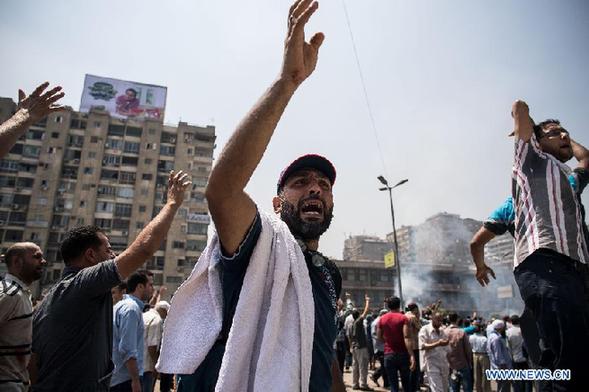Whither the Egyptian revolution
- By Heiko Khoo
 0 Comment(s)
0 Comment(s) Print
Print E-mail China.org.cn, August 19, 2013
E-mail China.org.cn, August 19, 2013
Barely two months ago, a vast display of power from the people led to the ouster of former President Mohammed Morsi. He promised democratic elections, and a new, prosperous future. Jubilant scenes of revolutionary celebration greeted this apparent victory for the voice on the street. But the revolutionary movement, unified against Morsi, brought together the supporters of the former dictator Hosni Mubarak, with leftists, liberals, and the mass of urban poor.
|
|
|
Ousted Egyptian President Mohamed Morsi's supporters shout slogans in Cairo's Nasr City, Egypt, Aug. 14, 2013. The Egyptian presidency announced on Wednesday a state of emergency nationwide for one month, due to the current turmoil over the dispersing of pro-Morsi protesters in the capital Cairo, the Egyptian state TV reported. [Li Muzi/Xinhua] |
The intervention of the Egyptian military to drive Morsi from office was designed to re-establish the popular credentials of the army and the state. In June, many welcomed the military coup, thinking that it would minimize the violent bloodshed that the overthrow of Morsi and the Muslim Brotherhood would produce. But we are witnessing this delayed clash now.
Although the Brotherhood was severely weakened by the Morsi's ouster, they retain a significant and powerful social base, independent of the state. They had nothing to lose politically from direct conflict with the military and were determined that their last stand would produce martyrs to inspire others. With hundreds killed in clashes with the army, they are now able to present themselves as defenders of democracy and Allah. They also stoked up conflict against Coptic Christians by torching churches, and their more radical sections will almost certainly adopt jihadist terrorism. However, the military and the wider state are confronted by the dilemma that the economic discontent of the masses cannot be dissolved by force. Before Morsi's removal, the International Monetary Fund pushed him to slash state subsidies, in the name of "necessary reform." Morsi correctly feared that these reforms would unleash uncontrollable social unrest.
The Egyptian state is not simply an instrument of crony capitalist economic interests; it is a multi-headed leviathan that seeks to defend its role as the supreme arbiter of domestic conflict. There can be no real democratic revolution in Egypt without popular control over the state apparatus. The army is a powerful economic force in its own right, controlling at least 15 percent of the economy. Saudi Arabia, the United Arab Emirates and Kuwait have just pledged a total of $12 billion in aid to Egypt's leaders. In addition, they receive $1.5 billion in military support from the United States government. This money will allow the military to offer some cosmetic concessions to the masses to create the appearance of socio-economic progress and buy temporary social peace. This will involve subsidized food and fuel, a boost to employment and a crackdown on crime. But the political crises of the past years have undermined investor confidence and crippled the tourist industry.
There will be sharp internal conflict in the military itself about its relationship with the will of the people. If a newly elected government carries out austerity, and if the anger of the people is repeated on the streets, will the military respond with an endless cycle of election, revolution and coup-d'états? Or, will internal social pressures find expression within a section of the military, as the nation's internal contradictions cause a split in its ranks?
Egypt's internal contradictions may even find expression in an individual personality. History occasionally seems to call forth such characters to represent its dilemmas in human form. Egypt's former President Gamal Abdel Nasser was such a figure. Nasser was a lieutenant colonel who inspired and led the revolutionary Free Officers' Movement that came to power in 1952. They ousted the monarchy and established the Egyptian republic with mass popular support - under the Revolutionary Command Council. It carried out land reform and socialist economic policies - including extensive nationalization, minimum wages, and free health care and education, backed by the Soviet Union.
The Muslim Brotherhood bitterly opposed Nasser at that time, and tried to assassinate him, after which they were repressed. In 1956, Nasser stood up to the Imperialist states and nationalized the Suez Canal Company. Egypt was attacked by Britain, France and Israel. Nasser's advocacy of Pan-Arabism, and his friendship with China and the USSR, did not prevent him from repressing communist forces inside Egypt. He combined progressive social policies with repression of internal opposition, and helped to foster an eclectic mix of socialist and Islamic ideology, which echoed throughout the Arab world - particularly in Syria and Libya.
Many of the problems that gave rise to Nasser and his movement remain at the heart of Egypt's plight today. It was the everyday needs and demands of the people that caused the Arab Spring. These same forces will continue to shape the fate of Egypt when the present bloody battles subside.
The author is a columnist with China.org.cn. For more information please visit:
http://china.org.cn/opinion/heikokhoo.htm
Opinion articles reflect the views of their authors, not necessarily those of China.org.cn.







Go to Forum >>0 Comment(s)